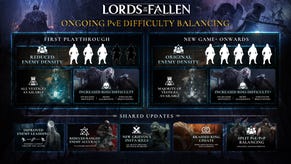Epic, Ouya, and GameStop agree: "the future of gaming is changing, and the future is here"
Epic Games VP Mark Rein feels it's "well past" time for a more powerful console transition, and with the "re-explosion" of PC gaming, both formats provide developers the opportunity to build "games of all sizes and weights" and an audience no matter which platform a consumer owns.
Speaking during an [a]listdaily attended panel at the GameStop Expo, alongside Ouya CEO Julie Uhrman and Eric Oria, director of marketing for GameStop, Rein said it's not like PC "really went anywhere," it's just that there's a new glut of games available now through services like Steam and a surge of quality in free-to-play offers such as League of Legends and World of Tanks.
However, one new trend Rein isn't a fan of is gaming companion apps, which are becoming more and more popular with developers especially, it seems, with next-gen.
“I'm not a big fan of companion apps,” said Rein. “I want the apps themselves. I don't want something that talks to Halo on my iPad – I want Halo on my iPad. I think that's inevitable, the power of these devices is increasing so quickly that sooner or later you're going to be able to deliver really awesome next-gen experiences.
"I think we we kicked it off on the iPhone 4 with Infinity Blade. The latest XCOM title on iPad is really, really good.”
Oria said the quality of games being shown on PS4 and Xbox One impressed him and he feels once developers master the systems within the next three to four years, they will only look and play better.
While the above comments referenced consoles and PC, Ouya CEO Uhrman said her attendance on the panel "shows the future of gaming is changing, and the future is here."
"Devices are getting more powerful, game creators are coming from everywhere, and I think every single person is a gamer," she said. "Those lines and definitions between what a hard core gamer is and a casual gamer really don't exist any more because we're playing on every single platform. In the future we're not even going to recognize what gaming is – I'm not even sure the word console is going to be a part of it.
"The future of gaming is freedom for the creators and a great experience for gamers.”
Rein agreed with both because he's "a committed graphics whore," but also feels alongside the new visuals and experiences, the independent developer has to be taken into account.
"There's this whole explosion of the independent developer," he said. "Even PlayStation and Xbox are making a big deal about giving developers access. Some of what next-gen is the ability to get experiences that weren't economical to bring to you from big huge companies, or were too crazy for those companies.”
Uhrman said she doesn't feel gaming should be just about graphics, because "games are just supposed to be fun."
"Whether it's a deep, immersive story, or it's incredibly action-oriented, or it's visually appealing, games at the end of the day whether you're spending $60 or trying it out for free they absolutely have to be fun," she said.
Continuing on the subject of graphics, Rein noted that browser-based games will also start looking and playing better with the advent of HTML 5.
"You're going to see the ability for us to bring last-generation, say Xbox 360/PS3, console experiences directly to web browsers without any risks or nonsense," he said. "Over time I think the PC will continue to make it easier and easier to get games you couldn't get before.”
During the discussion, the subject of disc-based and digital hybrid models was brought up. Rein said he doesn't think disc-based games will go away any time soon.
“I have Time-Warner cable and I have a 30 GB cap," he said. "The problem is as we get the next-generation, and both systems have Blu-ray discs, and now the games creep up in size, it's going to get expensive to download four of those games a month. We'll see a lot of improvements and add-ons coming in all the time through digital."
Such data caps could eventually impact a digital-only gaming world, as the games continue to get larger - more data would need to be downloaded and the cable and ISP companies would either make a killing off the gaming consumer, or cause people to stop buying games all together.
“It would really suck if the biggest amount of money in the system went to Internet providers," said Rein. "If they started metering Internet service to homes in the United States, we'd be fucked.
"I am definitely in the camp of being worried about what the cable companies are going to do to consumers in the long term.”










